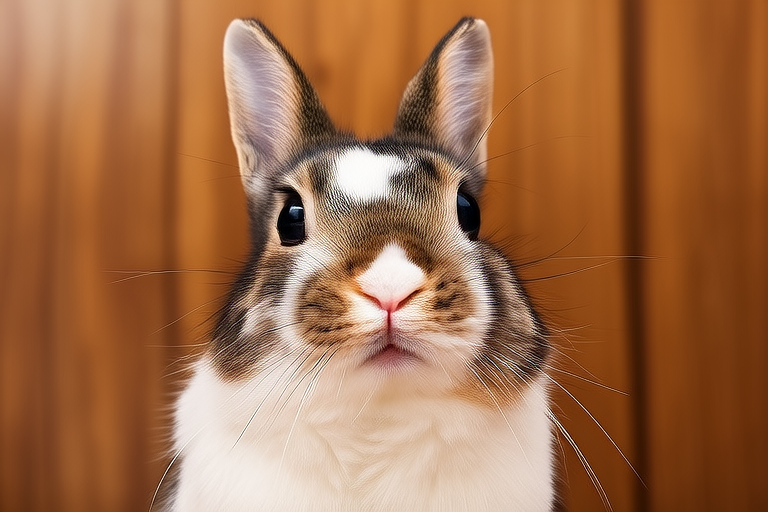Discover Why Dutch Dwarf Rabbits Are Stealing Hearts Across the Globe
Dutch Dwarf rabbits, with their petite frames and charming personalities, have been capturing hearts across the globe for decades. These diminutive creatures, known for their distinct appearance and friendly nature, have become increasingly popular as household pets. Their origins trace back to the Netherlands, where breeders selectively bred smaller versions of the larger Dutch rabbit, creating the Dutch Dwarf rabbit we know today.
A Brief History and Origins
The Dutch Dwarf rabbit breed was officially recognized by the American Rabbit Breeders Association (ARBA) in 1964. They were developed by crossing various small breeds of rabbits, such as the Netherland Dwarf and the Dutch rabbit. The goal was to create a small, friendly, and visually appealing pet that would be suitable for both show and home environments. Today, Dutch Dwarfs are celebrated for their versatility, making them ideal companions for families and individuals alike.
Unique Characteristics
One of the most striking features of Dutch Dwarf rabbits is their compact size. Adults typically weigh between 2 to 3 pounds, making them one of the smallest rabbit breeds. This manageable size makes them perfect for apartment living or small homes. Their distinctive appearance is another highlight, characterized by their short, dense coats and a wide variety of colors, including black, blue, chocolate, and white. Each Dutch Dwarf has a white blaze on its face, which adds to their unique charm.
Temperament and Interaction with Families
Dutch Dwarf rabbits are renowned for their gentle and affectionate nature. They are generally good-natured and enjoy the company of humans, making them excellent pets for families with children. These rabbits are highly social animals and thrive on interaction, often forming strong bonds with their owners. They are also relatively easy to handle due to their small size, but it’s important to always support their bodies when holding them to prevent injury.
Care Requirements
Diet
Proper nutrition is essential for maintaining the health and vitality of your Dutch Dwarf rabbit. A balanced diet should consist primarily of hay, which aids in digestion and dental health. Fresh vegetables and a limited amount of pellets should also be included in their daily meals. It’s crucial to avoid feeding them sugary or fatty foods, as these can lead to obesity and other health issues.
Housing
When it comes to housing, Dutch Dwarfs require a spacious cage or hutch that allows them ample room to move around and stretch their legs. The enclosure should be large enough to accommodate a litter box, food and water dishes, and a resting area. Additionally, providing toys and tunnels can help stimulate their minds and keep them entertained. Indoor living is recommended to protect them from outdoor predators and extreme weather conditions.
Exercise
Like all rabbits, Dutch Dwarfs need regular exercise to stay healthy and happy. Daily playtime outside of their enclosure is vital for their physical and mental well-being. Supervised time in a safe, enclosed area allows them to explore and engage in natural behaviors, such as hopping and digging. Providing ramps and platforms within their living space can also encourage climbing and jumping, helping to maintain muscle tone and agility.
Health Concerns and Well-being
While Dutch Dwarf rabbits are generally hardy, there are some specific health concerns to be aware of. One common issue is dental problems, which can arise if their diet lacks sufficient fiber or if their teeth grow too long. Regular check-ups with a veterinarian who specializes in exotic pets can help catch and address any potential issues early. Other common ailments include respiratory infections, which can be prevented by maintaining clean living conditions and avoiding exposure to drafts.
To ensure the well-being of your Dutch Dwarf, it’s important to provide proper grooming, particularly during shedding seasons. Regular brushing helps remove loose fur and prevents hairballs. Additionally, keeping their nails trimmed and their ears clean can contribute to their overall health and comfort.
Testimonials from Owners
“My family fell in love with our Dutch Dwarf rabbit, Lily, the moment she came home,” shares Sarah Thompson, a proud owner from California. “Her playful nature and affectionate demeanor make her a joy to be around. She’s incredibly gentle with my young children, and they adore spending time with her.”
Another owner, Mark Johnson, from New York, adds, “What I appreciate most about Dutch Dwarfs is their adaptability. They’ve easily adjusted to our busy household and have brought so much joy to our lives. Their small size means they don’t require as much space or attention as larger pets, yet they still manage to steal the heart of everyone who meets them.”
These stories reflect the widespread appeal of Dutch Dwarf rabbits. Their combination of adorable looks, friendly disposition, and minimal care requirements has made them irresistible to many pet lovers worldwide.
Conclusion
Dutch Dwarf rabbits continue to captivate hearts across the globe with their unique blend of charm and companionship. From their small size and distinctive appearance to their friendly nature and ease of care, these rabbits offer a delightful addition to any home. By understanding their dietary, housing, and exercise needs, as well as being mindful of potential health concerns, you can ensure a long and happy life for your Dutch Dwarf rabbit. If you’re considering adding a furry friend to your family, a Dutch Dwarf rabbit might just be the perfect match. Their ability to bring joy and companionship to households everywhere is undeniable, making them truly special pets.
